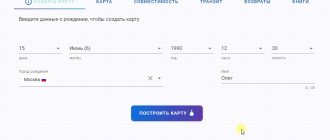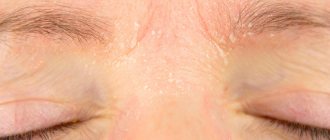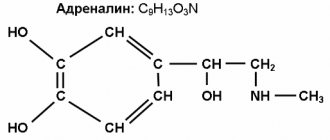Before you understand how panic attacks are treated, you should understand what kind of disorder it is, the reasons for its development, who is susceptible to it, and what the symptoms are.
The human body responds to stress by releasing the hormone adrenaline. It triggers a mechanism that prepares the body to confront a dangerous situation or escape: the heart begins to beat faster, breathing quickens. This leads to increased ventilation of the lungs and, as a result, the level of carbon monoxide in the blood decreases, causing dizziness, tingling in the fingers, numbness of the arms and legs.
Nature initially instilled in people just such an algorithm for responding to danger, so this is quite normal and characteristic of all representatives of homo sapiens. However, if such a mode “turns on” for no reason, then this will already be a manifestation of a panic attack, which is a mental disorder - one of the subtypes of anxiety conditions.
Types and causes of the disease
There are quite a lot of people in the world who are susceptible to panic attacks - up to 5% (most of them are women between 20 and 30 years old).
There are 3 types of panic attacks:
- spontaneous – sudden, appears without any obvious reason;
- situational - occurs in anticipation of a certain situation or directly during its course (before an exam, in anticipation of a conflict or directly during its course, etc.);
- conditional-situational - the impetus is a biological or chemical activator (change in hormonal levels, ingestion of alcoholic beverages, drugs, alcohol.
The following factors contribute to the occurrence of panic attacks:
- Genetic predisposition, that is, the disorder is transmitted with genes. In this case, it will be very difficult to cope with it and will take a long time.
- The presence of phobias, that is, fear of something.
- Poor monotonous diet, lack of vitamin B in the body.
- Significant event (wedding, birth of a child, death of a loved one, etc.)
- Certain diseases, inflammatory processes, hypoglycemia (low blood sugar), hyperthyroidism (activation of thyroid function), post-traumatic syndrome.
- Self-doubt, personal problems, failures in life.
- Having bad habits.
- Wrong lifestyle.
- Internal conflict.
- Depression.
- Taking strong antibiotics that have multiple side effects or are addictive.
- Withdrawal syndrome – refusal of alcohol. Such “withdrawal” often leads to nervous breakdowns and excessive anxiety.
- Hyperventilation syndrome from the habit of breathing deeply - this disrupts the balance of carbon and oxygen, which leads to the consequences mentioned above.
- Taking stimulants or narcotics, caffeine, antidepressants, or medications the simultaneous use of which is undesirable.
- Serious cardiovascular diseases that can lead to death. The person realizes this and at the slightest deterioration of the condition begins to panic.
- Consequences of very high physical or sports activities.
- Hormonal changes in the female body - pregnancy, before menstruation, menopause.
Diagnostics
If signs characteristic of panic attacks appear, you should contact a neurologist, psychologist or psychiatrist. Diagnosis begins with establishing the number of episodes of panic fear. A person is said to be susceptible to panic attacks if there are several such cases that arise spontaneously without the presence of a real threat to life and health, as well as outside the use of drugs or medications.
To develop the most effective treatment tactics, it is also important to establish the type of panic attacks. There are:
- expected (situationally related and situationally predisposed) – when anxiety attacks are associated with the presence of a specific fear, for example, heights;
- unexpected – when there is no obvious reason for the occurrence of fear and a clearly traceable trigger, so it is impossible to predict in advance the possibility of its occurrence.
In the first case, panic attacks are largely a consequence of the presence of one or another phobia, obsessive-compulsive disorder, post-traumatic disorder, or depression. Therefore, in these cases they are secondary, and therefore treatment will be aimed primarily at eliminating the cause of their occurrence.
Sometimes an additional consultation with a cardiologist, gastroenterologist, endocrinologist or pulmonologist may be required to detect disorders in the cardiovascular, endocrine, respiratory or digestive systems. In such situations, a fairly wide range of studies may be required to exclude underlying diseases, including:
- ECG;
- daily monitoring of ECG and blood pressure;
- Ultrasound of the heart, abdominal organs;
- X-rays of light;
- determination of the level of basic hormones;
- EEG;
- X-ray or MRI of the cervical spine;
- Doppler ultrasound of cerebral vessels.
Therefore, panic disorders, as the main diagnosis, are spoken of only in cases of sudden onset of severe anxiety with the development of physical symptoms to a greater or lesser extent. It is important that there is no anxiety during the period between attacks.
It is also necessary to establish the severity of the patient’s condition at the time of the attack using tests aimed at detecting fears and a special scale. The Spielberg scale is often used for this purpose. To do this, he is asked to fill out a special questionnaire or orally answer the doctor’s questions. In addition, it is important for the doctor to observe the patient over a certain period of time, and also to obtain information about when and what diseases he suffered, how often he is exposed to stress and how much he is exposed to it, what changes have occurred in his life, etc.
Signs of a panic attack
Many people, unfortunately, do not understand that they were “visited” by a panic attack, believing that their heart suddenly “grabbed”. Indeed, the symptoms of a panic attack are similar to a vegetative crisis: rapid heartbeat, pulsation in the temporal regions, lack of air - difficulty breathing, pain in the chest and abdomen. However, medications taken “for the heart” do not improve the condition in any way.
Also, at these moments, a person begins to either sweat or feel chills, his limbs tremble, the skin becomes numb or tingles, there may be dizziness and nausea, and an upset stomach. Everything seems unreal to him, blurry, that this is not happening to him (derealization and depersonalization), he goes crazy or dies. The patient experiences incredible fear, but there are also individuals who, instead, feel sadness; they always want to cry or be aggressive.
We can talk about the presence of a mental disorder such as panic attack syndrome if attacks occur several times a day or a couple of times a month, and last several minutes or up to an hour (the average is from 15 to 30 minutes).
The attack appears unexpectedly, without any pretext, and not in some frightening or alarming situation: in a store, on the street, in a cinema, while driving a car, at home - on the sofa, and even in a dream. A person at this moment can either be among people or be alone.
It can hardly be said that all of the above is dangerous to health, but panic attacks can lead to the development of neuroses, depression, and phobias. A patient, having experienced an unexpected attack, even a very short one, several times, tries to do everything to avoid a recurrence. He becomes suspicious, loses confidence, constantly “listens” to himself, gets nervous and tries to avoid places and situations where and in what case this happened. That is, now he is afraid of just such an attack and lives in constant anxiety and phobic avoidance.
The mechanism of the onset of panic disorder is very simple to explain using an example. A completely prosperous person, usually a strong personality, living a normal life, received a very strong emotion (anger, fear, etc.) in a certain traumatic situation. The brain absorbs this experience and stores it in the unconscious. That is, the individual himself seems to have forgotten everything, but this is far from the case: the negative is securely stored in a distant corner of the memory and, over time, added to it are memories of the troubles that inevitably accompany our life, no matter how wonderful and calm it may be .
One fine day, some significant event happens, very joyful or sad (the birth of a child, the death of a parent), and it, by coincidence, becomes the last straw that overflows the vessel with memories. Then it “explodes” and the person has a panic attack.
This sudden attack worries and worries a person, even if it passed very quickly. Such a lack of understanding of what happened, anxiety, tension and excess emotions about this can provoke another attack, and then they will happen again and again. The patient is frightened by his physical and mental state at these moments, he tries not to visit those places where he was overtaken by an attack - phobias appear. As a result, panic disorder develops, and if this problem is left to chance, the consequences can be very sad.
Causes of panic neurosis
The main reason for the development of panic neurosis is constant nervous tension. An important predisposing factor is the patient’s anxious and suspicious character.
Other reasons include:
- frequent psycho-emotional stress;
- mental contradictions with the surrounding reality;
- mental and (or) physical fatigue;
- decreased general immunity;
- frequent use of certain pharmacological drugs;
- consumption of common psychostimulants (coffee and strong tea);
- alcohol and drug addiction.
The combination of several factors increases the likelihood of developing a mental disorder. When treating mental neurosis, the cause that contributed to the onset of the disease must be taken into account. Please note: Some people tend to hide negative emotions, and they are repressed into the subconscious. However, after some time (often months and even years), seemingly forgotten experiences “break through” and cause a panic attack. In some cases, even experienced psychotherapists fail to identify the cause of panic neurosis.
Why panic attacks need to be treated
The syndrome may not appear too often: the interval between attacks can be quite significant, but sooner or later, the panic will return anyway, that is, nothing will go away on its own.
The consequences of this are:
- Since a panic attack can take you by surprise at any time, in any place, in public, the person suffering from the disorder begins to avoid loved ones, friends, does not go anywhere, and withdraws into himself.
- Various phobias develop - fear of open space, darkness, phenomena, i.e. anything.
- Psycho-emotional disorder leads to personality disorder.
- Self-doubt develops, which affects personality, appearance, family relationships, and professional activities.
- Sleep is disturbed, appetite is lost, and the body becomes dehydrated. As a result, the body suffers.
- Refusal to share problems causes problems in the nervous system.
It is imperative to get rid of this problem, since, judging by the above, it brings problems in social adaptation, worsens the quality of life, interferes with normal work, and negatively affects the physical and mental state.
Who to turn to for help and how to diagnose
Poor awareness among people about panic disorder leads to the fact that some consider it completely frivolous, while others consider it a dangerous incurable mental illness. Therefore, they believe, you should not go to doctors: in the first case there is no need, and in the second the main role is played by the fear of being branded as mentally ill. Both opinions are completely unfair: it is both very serious and completely controllable and treatable. A competent approach will allow you to successfully and fairly quickly get rid of the problem.
First of all, you need to understand that you need to contact only experienced, highly qualified specialists - a psychiatrist, who will develop treatment tactics based on the causes of a panic attack, because they are the ones that need to be eliminated. The doctor will determine why the patient’s nervous system could not withstand the load and malfunctioned in the form of panic manifestations.
The doctor must carefully examine the patient to establish an accurate diagnosis and study the symptoms. The selection of therapy is made based on the characteristics of the patient’s body on an individual basis. The work of a professional consists not only of recommendations and prescribing certain medications, but also of carefully monitoring the progress of treatment and, if necessary, its correction.
As for the psychologist, such a specialist is useless in this case - he is not able to identify the causes of the pathological disorder and prescribe medication and psychotherapeutic treatment, which, in case of getting rid of this problem, are necessary. The picture is the same with sorcerers, psychics and “wise” advisers from the Internet - they will only bring harm to the patient, which is then quite difficult to correct, aggravating his not the best condition.
The psychiatrist, first of all, will seek advice from a cardiologist, therapist, endocrinologist, neurologist, or psychotherapist. This is necessary to exclude the presence of somatic and serious mental illnesses.
It should immediately be noted that a therapist in ordinary clinics does not have the opportunity to carefully and competently examine the patient. In addition, long queues and the nervous atmosphere in them often serve as an impetus for another panic attack, and the person generally loses all desire to be treated.
In specialized paid clinics, such a picture is not observed: any person who comes here receives great attention. In addition, it is usually comfortable; highly qualified doctors work here, “armed” with advanced techniques and equipment for accurate diagnosis and successful treatment. The latter implies the use of pharmacology, psychotherapy, physiotherapy in combination, as well as changing the usual lifestyle.
The attitude of the patient himself to the treatment of panic attacks is also important - he must understand his problem, that this, in essence, is not a disease at all, but a sign of a disorder of higher nervous activity. For a successful result, you need the desire and good will of the patient, compliance with all the doctor’s recommendations.
Medication support
A psychiatrist is involved in selecting medications for the treatment of panic attacks. A properly selected medication regimen will quickly reduce the frequency, intensity and number of symptoms of panic attacks. Appointments may include:
- Tranquilizers for quick relief of panic attacks. These drugs can cause addiction, so in no case should you increase the dosage on your own and use them daily, just to prevent attacks. These remedies are first aid for a severe panic attack, nothing more.
- Antidepressants for panic attacks. These drugs are used in serious cases where a panic attack occurs due to depression. This indicates a serious stage of the disease, which may require not only treatment for panic attacks, but also treatment for depression in a hospital.
- Beta blockers. The drugs quickly reduce high blood pressure and tachycardia during panic attacks.
- Nootropics. People suffering from panic attacks often complain of problems with memory and thinking in general. These drugs help improve blood circulation and brain performance.
Drug therapy
Certain medications can help reduce some of the symptoms of a panic attack. If the patient’s brain has a disturbance in the exchange of neurotransmitters, the balance of the processes of excitation and inhibition, then they are prescribed much more than in milder cases.
At the first stage, medications relieve the attack, and then restore the functioning of various brain systems. They are able to eliminate the panic state altogether, or weaken it.
- Tranquilizers are prescribed at the very beginning of treatment and not for long, as they cause addiction. These drugs extinguish the severity of the attack, stabilize the autonomic system, and normalize sleep.
- Antidepressants require caution - you need to be careful about their contraindications, so the selection is strictly individual. It is interesting that similar products from different manufacturers can have different effects on the patient.
- Antipsychotics are used extremely rarely - only if panic disorder cannot be cured with other medications, as well as in the presence of a personality disorder or metabolic disorders in the brain. In addition, they are very difficult to find.
- Neurometabolic drugs are very active, so they are used strictly in courses and administered in the presence of a doctor. They allow you to reduce the doses of other psychotropic drugs.
It is necessary to emphasize once again that all of the above medications are prescribed personally. The doctor should pay special attention to their effect on the patient, especially in the first days, monitor the intake, cancel and re-prescribe in case of adverse events.
Psychotherapeutic treatment
Panic attacks cannot be cured without psychotherapy using the following techniques:
1.Cognitive behavioral therapy is considered the most effective in this area - it is called the “gold standard”. The patient, with the help of a specialist, goes through several steps:
- changes your thoughts about panic to more positive ones;
- learns techniques that reduce anxiety;
- learns to overcome agoraphobia, etc.
This therapy models thinking and behavior during an attack. For example, the following situation is played out: you have a panic attack while you are driving a car. If you pull over and stop, will anything bad happen? Will you crash your car or die? Hardly! It is precisely this belief that the patient develops, and he ceases to be afraid of an attack.
2. Classic hypnosis involves putting the patient into a trance state, in which he is encouraged to get rid of panic disorder. This method shows good results, but not all people succumb to it.
3. Ericksonian hypnosis allows you to resolve internal conflicts. It is softer, since the person himself enters a trance with the help of a psychotherapist. Moreover, in this case it is believed that there are no non-hypnotizable people. In addition, the patient learns self-hypnosis, which helps him prevent panic attacks by reducing anxiety levels.
4. Body-oriented therapy is a whole set of methods that involve working with the body (by influencing it and regulating sensations, you can reduce the level of anxiety). This includes:
- breathing techniques;
- relaxation according to Jacobson.
5. Systemic family psychotherapy sees the cause of panic disorder in the family, in the relationships and disharmony existing there. That is, the patient’s condition depends on all members of his family, and therefore work is carried out with all of them.
6. Psychoanalyst sees the causes of panic attacks in unconscious conflicts - meaning feelings of guilt, problems with parents, internal aggression, etc. Therefore, the psychoanalyst will clarify these very conflicts for several years. It is this prolongation that is the disadvantage of this method.
Physiotherapeutic procedures such as:
- relaxing and tonic physical therapy;
- massage course;
- aromatherapy;
- mesodiencephalic modulation of the cerebral cortex (MDM therapy);
- electrosleep;
- color therapy.
During the course of treatment for PA, the patient may begin to doubt that it is happening correctly, that he needs psychotherapy and that it is truly successful, and that the medications have a positive effect. In addition, circumstances may turn out to be such that he violated the doctor’s recommendations and the prescribed regimen. At the same time, he may have a seizure. Therefore, the patient should not hesitate to ask for help or consult with his leading specialist. The latter will be ready at any time to answer all the patient’s questions both over the telephone and in a face-to-face meeting. Such communication, especially in the early stages, should be continuous.
help yourself
Early diagnosis and timely treatment allows you to completely get rid of panic attacks, of course, if they have become chronic. You can contribute to professional treatment at home or know how to relieve an attack and alleviate it, strengthen the body and eliminate negative factors.
The following folk remedies will help reduce fear:
- Pour 300 ml of boiling water over a teaspoon of dry oregano, leave for 10 minutes, strain. Drink 150 gr. four times a day.
- 100 gr. pour 500 ml of boiled water into young birch leaves. After infusion, strain for five hours. Take 100 ml every day.
- Infusion of linden or chamomile. Pour boiling water (a glass) over a teaspoon of dried inflorescences and after half an hour you can drink it as tea, having first strained it.
Motherwort juice is also good; alcohol tincture of oregano; decoctions of lemon balm and mint; infusions of valerian, wormwood, nettle, hops.
You can help an upset psyche by walking on grass or bare ground with bare feet (even in the cold season) - this calms you down.
Aromatherapy gives excellent results - candles with essential oils of pine, eucalyptus, juniper. A massage with these substances won't hurt either.
Experts advise drinking as little strong tea and coffee as possible, sitting less at the computer and in front of the TV, walking more in the fresh air, playing sports and being physically active. The day should be distributed correctly between time for work, rest and sleep. You need to monitor your diet - it should be rational and not contain spicy seasonings. Avoid bad habits (smoking, alcohol), take vitamins.
Those susceptible to panic attacks should adhere to the following rules:
- Don't be alone, don't isolate yourself. Communicate with family and friends, tell them about your condition - they will help you cope with it. Keep a diary, share your thoughts with him, analyze them, tune in to something pleasant.
- Relax more often - read, spend time in nature, watch a fun movie, take a bath, listen to good relaxing music, that is, have a good rest. You can learn to meditate and do it at home, in silence, in a calm environment.
- Learn to breathe correctly, master a breathing technique that reduces hyperventilation of the lungs and thus alleviates panic symptoms - through a paper or plastic bag. An excellent option is Pilates, that is, breathing exercises. Sign up for the section and practice it under the guidance of an experienced instructor.
- Gradually, with the help of training the nervous system, develop immunity to stress, do not engage in self-hypnosis of fear of anything, do not scold yourself.
- If the situation gets out of control, immediately contact a specialist.
- Set yourself up for positivity. When anxious thoughts appear, try to switch to something good.
Treatment of panic attacks in women and men
Treatment of panic disorders usually requires the help of specialists in two fields: a neurologist and a psychologist or psychotherapist. This is due to the fact that complex therapy, including medication and psychotherapeutic treatment, is most effective. The use of only psychotherapeutic methods can be recommended exclusively for mild attacks occurring with a moderate level of anxiety. But drug treatment is basic. Since panic disorders dramatically increase the likelihood of suicidal behavior, refusal of drug therapy can lead to tragic consequences. Therefore, today an integrated approach is used to treat panic attacks in men and women, including psychotherapy and drug correction.
To control the patient’s condition and reduce the risk of developing repeated anxiety attacks, various drugs are used, the choice of which is carried out on an individual basis. These include:
- tricyclic antidepressants;
- MAO inhibitors;
- serotonin reuptake inhibitors;
- β-blockers;
- combination antidepressants;
- nootropics.
Sometimes anxiolytics or tranquilizers are prescribed, both to relieve panic attacks directly and for long-term use to eliminate the likelihood of developing new episodes.
As for psychotherapy, it should never be neglected in the treatment of panic disorders. It is no less important than drug treatment, and in the same way is selected strictly individually by the attending physician based on the medical history and characteristics of the patient.
As part of psychotherapy, people suffering from panic attacks may be offered:
- cognitive behavioral therapy;
- psychoanalysis;
- hypnosis;
- systemic family psychotherapy;
- NLP;
- Gestalt therapy;
- body-oriented psychotherapy.
You should not be afraid of psychotherapy and consider working with a psychologist or psychiatrist to be unimportant or beneath your dignity. It is an important element in the fight against panic attacks and helps reduce anxiety, overcome the effects of stress, chronic fatigue, internal conflicts and get rid of accumulated grievances.
Cognitive behavioral therapy is the type of psychotherapy used most often to treat panic disorders. It includes a number of successive stages with the goal of making the necessary adjustments to the patient’s thinking and attitude towards anxiety. Initially, the doctor will explain the pattern of development of a panic attack and help the patient understand how it occurs and what mechanisms are involved. This will help you get your anxiety under control and get rid of the fear of going crazy or dying during a panic attack from a heart attack or other cause.
Cognitive behavioral psychotherapy involves:
- keeping a self-observation diary;
- meditation practice;
- application of muscle relaxation techniques;
- use of breathing practices;
- detection of factors leading to increased anxiety and carrying out work to eliminate them.
The course of treatment usually consists of 8-20 sessions.
Other methods, in particular psychoanalysis, are used much less frequently in the fight against panic disorders. It is mainly used in the development of anxiety due to the action of specific traumatic factors. At the same time, hypnosis, as a method of treating panic attacks, can give good results in the short term, but it is not suitable for all patients.
It is imperative to minimize the amount of stimulants, i.e. give up or at least significantly reduce the amount of coffee, tea consumed daily, quit smoking, etc.
Tricyclic antidepressants
These are one of the first antidepressants to appear on the pharmaceutical market. They are indicated for patients who have suicidal thoughts, but cannot be used in severe cardiovascular disorders and in elderly patients.
When choosing drugs from this group, it is important to strictly follow the doses recommended by the doctor and increase them to the optimal dose in strict accordance with the developed regimen. In this case, after 2-3 weeks, tricyclic antidepressants will give the expected therapeutic effect and will lead to the complete elimination of panic attacks no later than 4 weeks after the start of treatment.
Their cancellation is also carried out only as prescribed by the attending physician, but even in this case it is important not to immediately stop taking the drug, but to gradually reduce the dose according to an individually designed regimen. However, you need to be prepared for the fact that the process of stopping tricyclic antidepressants may take about a month.
MAO inhibitors
Drugs of this pharmacological group are used for the treatment of panic attacks less often than tricyclic antidepressants, since they more often cause the development of unwanted side effects. Nevertheless, it is MAO inhibitors (monoamine oxidase) that are used for panic attacks that occur with a predominance of autonomic disorders, as well as when tricyclic antidepressants are ineffective.
The choice of a specific drug and dosage is carried out strictly individually. In this case, a minimum dose is initially prescribed, which is gradually increased under the supervision of a physician until the optimal dose is reached. During this period, patients may notice an increase in the level of excitability and become nervous. This is not considered a reason to discontinue the drug and goes away on its own when the main dose of the drug is reached.
It is important not to take MAO inhibitors and tricyclic antidepressants, drugs that increase serotonin levels, and some other drugs at the same time. Their combinations can cause the development of a hypertensive crisis with a sharp increase in blood pressure. Therefore, if it is necessary to change tricyclic antidepressants to MAO inhibitors or undergo another course of treatment, you need to agree with your doctor about this possibility and take a break from treatment for 2-3 weeks.
MAO inhibitors do not combine well with many drugs, in particular PDE-5 inhibitors (Viagra, Cialis, Levitra and their analogues), used by men to combat erectile dysfunction.
Also, for the same reason, you cannot combine the use of MAO inhibitors with products containing tyramine. This:
- all types of cheeses and cheese products;
- any smoked meats;
- marinated, dried fish;
- all types of legumes;
- sauerkraut;
- alcoholic drinks, especially beer, wine and whiskey.
Serotonin reuptake inhibitors
Drugs in this group, also abbreviated as SSRIs, are among the most modern types of antidepressants, and their choice is quite extensive. Their advantages are high efficiency in the fight against panic disorders and a significantly lower risk of side effects. At the same time, SSRIs can be used to control panic attacks in patients with heart pathologies, bronchial asthma and other disorders. And their main disadvantage is considered to be the occurrence of increased excitability, increased nervousness, and anxiety in the first time after the start of treatment. Also at this time, insomnia and a sharp change in mood to the radically opposite may be observed. In this regard, drugs in this group are rarely prescribed to adolescents.
In the same way as when prescribing tricyclic antidepressants or MAO inhibitors, the required dose of SSRIs is achieved gradually, starting with small dosages. The effect of treatment can be assessed after 1-2 weeks.
β-blockers
Drugs in this group are used in the presence of disturbances in the functioning of the cardiovascular system. They help normalize blood pressure and reduce heart rate. At the same time, which is important in the treatment of panic disorders, β-blockers neutralize the effect of catecholamines, which include adrenaline. Therefore, with their help it is possible to eliminate the main manifestations of panic attacks.
Nootropics
Nootropics are used exclusively as an adjunct to antidepressants or other anti-anxiety medications. Their main properties are to improve the functioning of the brain, activate cerebral circulation and increase the intensity of metabolic processes in the nervous structures. At the same time, nootropics help to increase the level of stress resistance, which has a beneficial effect on the well-being of patients with anxiety disorders. But when taking them, their stimulating effect on the nervous system should be taken into account. Therefore, you should not take nootropics at night; it is better to do it in the first half of the day.
Thus, panic attacks are quite common. And although they do not pose a serious threat to a person’s life and health, such attacks of anxiety and outright panic significantly reduce the quality of life and can cause the development of serious mental disorders, including suicidal ones. Therefore, it is important not to ignore the problem or try to deal with it on your own. A much better result will be obtained by contacting a neurologist and psychotherapist. These specialists will help eliminate the causes of panic attacks as quickly as possible and teach a person to control their emotions, increase the level of stress resistance and, in general, achieve the disappearance of attacks of unreasonable panic.
4.7 3 votes
Article rating
What to do in case of a sudden attack
If you feel the onset of a panic attack, you can prevent it using the following recommendations:
- in the first seconds, the gas balance provoked by hyperventilation should be normalized. To do this, you need to breathe into cupped palms or a paper bag;
- you need to close your eyes, relax, think about something good. It doesn’t hurt to lie down and at least take a nap;
- switch to the process that was affected by the crisis and continue to carry it out. On the street, you can start counting people passing by, solving arithmetic problems in your head, etc.;
- start singing your favorite song loudly – cheerful, energetic. The most suitable option is a children's room;
- surging heat and clouded consciousness can be cooled and cleared in the shower or by washing the face and skin behind the ears with cold water. Next, you need to look at yourself in the mirror and try to catch the moment the attack recedes;
- drink a cup of hot tea with honey and lemon balm - this soothing drink will calm you down and make you fall asleep;
- Massage your ears or palms - press the membrane between your thumb and index finger and hold it there for a count of five. Do this until the fear passes;
- chew chewing gum, which you should always have with you. The brain will switch, the numbness and excitement will go away. At this moment, you should start doing some distracting but pleasant things;
- Having auto-training skills, you can repeat to yourself - nothing bad happened, there is no danger, everything will pass very quickly.
Recommendation for those who are close to a person who is in crisis: do not be nervous, but take him by the hands and in a very calm voice convince him that everything is fine and will end well.










